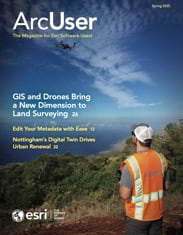As an undergraduate majoring in economics and geography, I initially leaned toward economics as a future career path. Even before stepping into the world of GIS, I was passionate about managing resources to analyze and solve socioeconomic challenges in real time. I have always thought of myself as a “street economist,” since I began to teach myself these skills before tackling them in a formal educational environment. But GIS has amplified my ability to analyze, visualize, and solve socioeconomic challenges in a spatial context, with location-based problem-solving. Finding my passion for spatial problem-solving has led me directly to where I am now in my geospatial career—a PhD candidate at Texas State University studying GIScience who has found success as a GIS professional.
After graduating from Ghana’s University of Cape Coast in 2018, I began my compulsory one-year national service at the Ghana Lands Commission. There, I was introduced to property appraisal software while assisting as a land valuation apprentice and on-the-side land surveyor using AutoCAD.
After the onset of COVID-19, I asked myself what I could do to survive and support my family amid the ongoing effects of the pandemic. GIS provided a way to do both. Working with GIS is a skill that allows one to work remotely, solve spatial challenges, and connect other applications with spatial analysis. GIS became my calling, offering me both a purpose and a practical path forward.
Later, in 2022, I served as an assistant GIS utility officer at Ghana Water Company, where I was exposed to the ArcGIS technology that I now use regularly to solve spatial problems. This was the turning point—I was overwhelmed by how GIS tools could map solutions to real-world issues, and I felt a deep joy seeing the tangible results of my work.

Conferences and Connections
In my previous roles as a field officer, I enjoyed meeting clients face-to-face and solving their issues in real time. My ongoing GIS studies have been no different. Since moving to the USA, I have attended academic conferences hosted by several organizations. These include the Southeastern Division of the American Association of Geographers (SEDAAG), the American Association of Geographers (AAG) Annual Meeting, American Geophysical Union (AGU), the Esri User Conference, NASA’s DEVELOP Day, and the Southwest American Association of Geographers (SWAAG). I have traveled to more than 12 states in the span of two years.
These conferences provided me with valuable opportunities to expand my GIS knowledge and connect with professionals in the industry. However, the experience that truly transformed my perception of GIS was being selected as a student assistant for the 2024 Esri User Conference in San Diego, California. This event opened my eyes to the immense possibilities of GIS. I met incredible professionals who suggested innovative ways to improve my work, which I approached with a revitalized mindset.
Another defining moment was attending AGU 2024 (AGU’s Annual Meeting) in Washington, DC, an impactful showcase of science and geography. As someone passionate about spatial analysis, this was another reminder that GIS offers endless opportunities to make a meaningful impact. Whether it’s understanding urban development, solving environmental issues, or improving access to resources, there is a niche for everyone in GIS—even a “street economist” from a place of limited resources like Ghana.
Practical Advice for Students and Young Professionals
One major factor that led to my quick progress in the field of GIS was looking for opportunities to attend conferences and seminars. In attending these valuable events and connecting with students, mentors, and industry experts, I have compiled some advice that will hopefully help someone else navigate their own GIS journey.
1. Build Your Network
Don’t be shy. Attend conferences, workshops, and webinars. Speak to professionals and share your ideas. Opportunities often come through relationships and are frequently the conduit for opportunity.
2. Develop Transferable Abilities
GIS abilities, paired with skill sets in subjects such as economics, public health, or environmental science, are extremely important. I concentrate on learning technical skills, like geographic analysis, mapping, and programming (via Python for Everybody) through Esri massive open online courses (MOOCs), LinkedIn Learning, and YouTube, among others.
3. Be Adaptable
Careers are not necessarily linear. I began as an economist and discovered my interest in GIS via real-world experience. Be open to new directions.
4. Never Stop Learning
Make time to learn tools such as ArcGIS Pro, Python, and other geospatial technologies. Self-learning through books, online courses, and tutorials can help you stay ahead of the competition.
My journey has taught me that success is not just about where you start, but how you adapt, connect, and keep pushing forward. If you’re looking to blend your passion with technology, GIS is the tool that can make it possible.


